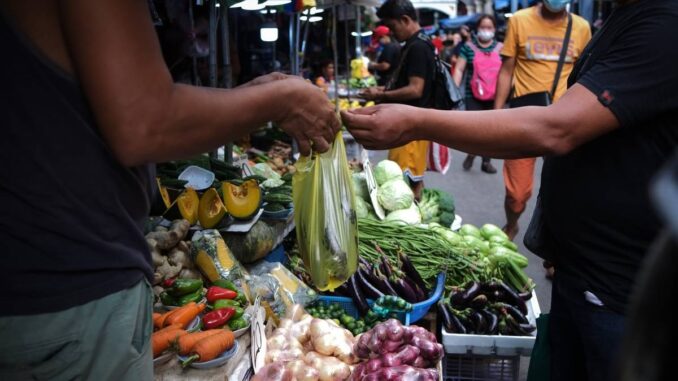
INFLATION could rise this month in the wake of a typhoon after having slowed in August, an analyst said.
Consumer price growth slowed to 3.3 percent last month, returning to the 2.0- to 4.0-percent target after spiking to 4.4 percent in July.
HSBC Global Research economist Aris Dacanay said this could be a brief relief with risks for September leaning toward the upside.
“Typhoon Yagi just left the archipelago and damaged agricultural lands while claiming lives,” he noted.
“Like July CPI (consumer price index), we might also see a sharp m-o-m (month-on-month) jump for the month of September as Typhoon Yagi takes a toll on food supply,” he added.
The inflationary impact of the typhoon, Dacanay said, may build a “case of a temporary rate pause.”
The Department of Agriculture has reported that farm damage from Yagi, called Enteng locally, has exceeded P600 million.
The loss in terms of volume has nearly doubled to 28,788 metric tons, valued at P659.01 million, from the 15,205 metric tons worth P360.18 million reported earlier this week.
Rice production was said to have suffered the most, with losses totaling P624.06 million, and possible price spikes due to supply issues could push rice inflation higher.
High rice prices due to the impact of the El Niño weather pattern on output were blamed as inflation surged earlier this year.
With supply having improved and the government ordering lower tariffs on imports of the grain, rice inflation slowed to 14.7 percent in August from 20.9 percent a month earlier.
National Statistician Claire Dennis Mapa expects this rate to further go down to a single digit in September.
Nomura economist Euben Paracuelles, meanwhile, raised his inflation forecast for this year to 3.1 percent from 2.8 percent, saying that the rice tariff cut had had no effect last month.
“Our revision mainly reflects the fact that the pass-through from the cut in rice import tariffs did not materialize in August, in contrast with our previous assumption,” he said.
Inflation will go down by 2.0 percent in the fourth quarter of this year, Paracuelles continued, “as the impact of the rice tariff cuts become more evident from October, based on our revised assumption of the timing of the pass-through effects.”
As inflation trends downward, the BSP is likely to continue cutting rates this year after starting its easing cycle in August.
Nomura expects the central bank to reduce rates by 25 basis points during its last two meetings of the year.
“The Fed’s rate cuts, which our US team expects to begin in September, also support further easing by BSP,” Paracuelles said.


Be the first to comment